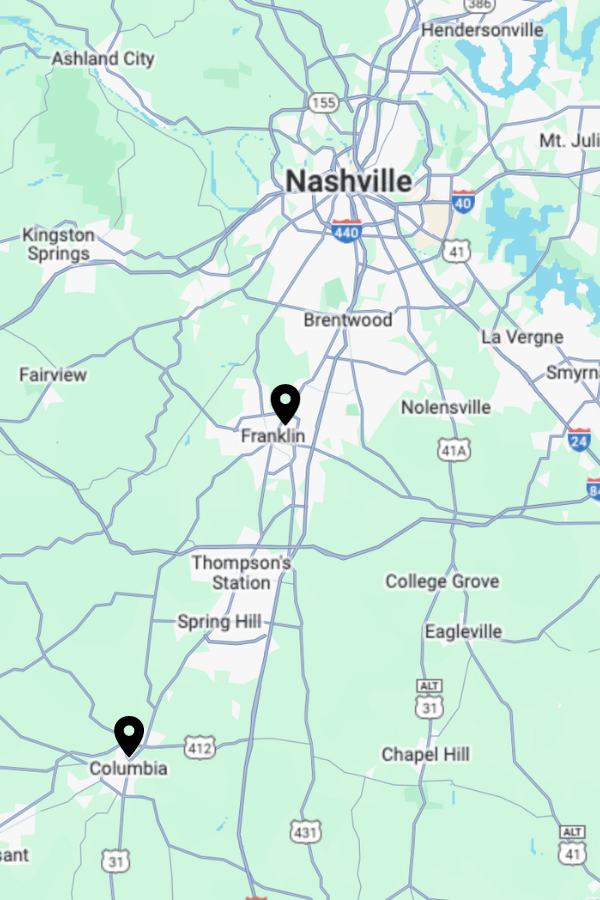Apex Addiction Recovery Center offers dynamic rehab programs in Tennessee, helping people with substance abuse and mental health challenges. Our tailored approach ensures individualized care, with evidence-based treatments to support recovery across both states. With a commitment to holistic healing, Apex Recovery provides a supportive environment for those on their journey towards health and sobriety.
Apex Recovery is aligned with many health insurance providers, offering in-network coverage for treatment programs. This means that people seeking treatment can often utilize their insurance benefits to cover the costs of Apex Recovery’s services. By accepting insurance, Apex Recovery makes rehabilitation financing programs more accessible and affordable for those in need of support and recovery.

What is An Addiction and Mental Health Rehab Center?
An addiction and mental health rehab center is a sanctuary for people confronting substance abuse and psychological challenges. Staffed with a diverse team of experts, including therapists, psychiatrists, and nurses, these facilities offer personalized treatment plans including detoxification, therapy, and aftercare. Through group sessions and individual counseling, clients find solidarity and personalized support.
Holistic therapies like art therapy and mindfulness augment traditional methods, promoting holistic healing. These centers prioritize individualized care, recognizing the complex interplay of biological, psychological, and social factors. Ultimately, they guide people toward recovery, resilience, and a future full of renewed purpose and possibility.
Free Addiction Assessment
Schedule a free, confidential assessment with a licensed clinician. Apex Recovery can check your insurance coverage levels for drug and alcohol addiction, and mental health treatment.
- Please complete and send the form below.
- One of our staff members will contact your insurer to check your coverage.
- We will contact you promptly with the results and to discuss the next steps.
Insurance Verification
"*" indicates required fields

How Much Does Addiction and Mental Health Rehab Cost?
The cost of addiction and mental health rehab varies depending on factors such as the facility’s location, amenities, and the level of care needed. Generally, inpatient programs can range from $5,000 to $30,000 per month, while outpatient programs may cost between $3,000 to $10,000 per month. Many factors influence pricing, including therapy sessions, medication management, housing, and meals.
Looking into how to pay for rehab, some facilities offer financial assistance, sliding-scale fees, or accept insurance to alleviate costs. Despite the expenses, investing in rehab can lead to long-term savings by reducing future healthcare and societal costs associated with untreated addiction and mental health issues. Let’s learn more about how to pay for residential mental health treatment and addiction treatment.
What is Rehab Insurance Coverage?
Insurance coverage for rehab is the extent to which health insurance policies provide financial assistance for addiction and mental health treatment services. Typically, coverage depends on the specific plan and provider, but it often includes features like inpatient and outpatient rehab, medication management, therapy sessions, and detoxification programs.
Some insurance plans may have limitations on the types of treatment covered or require pre-authorization for certain services. Additionally, people may need to meet specific criteria or demonstrate medical necessity to qualify for coverage. Understanding one’s insurance policy and exploring available benefits can significantly offset the financial burden of seeking rehabilitation, making treatment more accessible to those in need. At Apex Drug and Alcohol Addiction Recovery Center, we are ready to help you navigate the ins and outs of your rehab insurance. Contact us online or call us at (877) 881-2689 today.
Does Health Insurance Cover Addiction and Mental Health Treatment?
Yes, health insurance typically covers addiction and mental health treatment to varying extents, depending on the policy details and the insurer. Major insurance brands like Blue Cross Blue Shield, Aetna, Cigna, UnitedHealthcare, and Humana often offer coverage for these treatments, including services such as detoxification, outpatient and inpatient rehab, therapy sessions, and medication management.
As you research how to get insurance to pay for rehab, know that the extent of coverage can differ widely among policies, with differences in co-pays, deductibles, and out-of-pocket maximums. Insurers may also have specific networks of providers or require pre-authorization for certain services. It’s essential to verify your benefits and get answers to questions like, “How many times will insurance pay for rehab, or How to pay for residential rehab?”, as well as limitations or requirements of your insurance plan to optimize your coverage for addiction and mental health care.

Addiction and Mental Health Treatment Facilities that Take Insurance
Finding addiction and mental health treatment facilities that accept insurance is crucial. If you’re seeking assistance in Tennessee, reach out to Apex Recovery at (877) 881-2689. Our compassionate team can help check your insurance coverage and guide you toward the support you deserve. Explore below to learn more about insurance-friendly addiction treatment payment options and how to maximize your benefits.
Free Addiction Assessment
Schedule a free, confidential assessment with a licensed clinician. Apex Recovery can check your insurance coverage levels for drug and alcohol addiction, and mental health treatment.
Rehab Facilities in Middle Tennessee (TN)
Middle Tennessee, including Franklin and Columbia, is home to Apex Recovery Franklin, situated at 4601 Carothers Pkwy STE 250A, Franklin, TN 37067, and Apex Recovery Columbia, located at 2710 Trotwood Ave Suite A, Columbia, TN 38401. Apex Addiction Recovery Center in Tennessee is an invaluable support network for those seeking recovery from addiction.
Apex Recovery Franklin
4601 Carothers Pkwy STE 250A
Franklin, TN 37067
Apex Recovery Columbia
2710 Trotwood Ave STE A & B
Columbia, TN 38401
How to Get Into Rehab Without Insurance?
Understanding how to pay for rehab without insurance can be a daunting challenge, but numerous options are available to help bridge the financial gap. The journey to recovery should not be hindered by financial constraints. Many facilities and organizations offer a variety of payment solutions and substance abuse treatment funding opportunities, ensuring that people seeking help can find the support they need.
- Sliding Scale Fees: Many rehab centers offer sliding scale fees based on a person’s income. This means the cost of treatment can be adjusted to match what you’re capable of paying, making rehab more accessible to those with limited financial resources.
- Rehab Center Payment Plans: Some facilities allow patients to pay for their treatment over time with installment plans. This breaks down the total cost into more manageable monthly payments, easing the immediate financial burden.
- Loans: Personal loans for rehab can be obtained from banks or other financial institutions. These loans can cover the cost of rehab, and repayment terms vary by lender. However, it’s crucial to consider the interest rates and terms to ensure they are manageable in the long run.
- Grants and Scholarships: There are organizations and foundations that offer grants and scholarships specifically designed to cover the costs of addiction treatment. Researching and applying to these programs can provide much-needed financial support without the need to repay. Check local rehab facilities for grants and scholarships and the Substance Abuse and Mental Health Services Administration (SAMHSA), which provides grants for rehabilitation through its Center for Substance Abuse Prevention and Treatment.
- Fundraising: Crowdfunding for rehab through platforms like GoFundMe allow people to raise money for rehab from friends, family, and even strangers. Sharing your story can garner support from your community and beyond, helping to fund your treatment.
- Employee Assistance Programs (EAP): Some employers offer employer-provided benefits for rehab: EAPs that provide confidential assessments, short-term counseling, referrals, and follow-up services for employees. These programs may cover the cost of rehab or offer guidance on accessing affordable treatment options.
- HSA or FSA: Health Savings Accounts (HSA) or Flexible Spending Accounts (FSA) are pre-tax savings accounts used for medical expenses. If you have an HSA or FSA, you can use these funds to pay for rehabilitation services.
So, do you have to pay for rehab? With these options, you can bring down the costs substantially and get started on your path to healing.

Is It Worth Paying For Rehab If You Don’t Have Insurance?
Yes, it’s worth paying for rehab even without insurance. The cost of not addressing addiction can far outweigh the expense of treatment. Rehab offers a structured environment with medical supervision, therapy, and support groups, providing essential tools for long-term recovery. Without treatment, addiction can lead to severe health issues, strained relationships, legal problems, and financial ruin.
Additionally, investing in rehab demonstrates a commitment to self-improvement and a desire for a better future. Many facilities offer flexible payment options, scholarships, or sliding scale fees to accommodate various financial situations. Ultimately, the benefits of sobriety and improved quality of life far exceed the financial cost of rehab.
How to Find Substance Abuse and Mental Health Treatment Near Me without Insurance?
Finding substance abuse and mental health treatment without insurance can be challenging but not impossible. Start by contacting local community health centers, nonprofit organizations, or government agencies, as they often provide low-cost or free services. Utilize online directories or hotlines to locate nearby treatment facilities.
Additionally, consider reaching out to support groups or helplines for guidance and resources. Exploring options like sliding scale fees, payment plans, or grants can also help make treatment more affordable. Here at Apex Substance Addiction Recovery Center, we have all the answers you seek. Give us a call today. Remember, seeking help is a crucial step towards recovery, and there are resources available to support you on your journey.

Addiction and Mental Health Treatment Statistics
- 7.7 million U.S. adults have co-occurring mental health and substance use disorders
- 20.3 million U.S. adults have substance use disorders
- Of those adults, 37.9% also had mental health disorders
- 42.1 million adults in the U.S. had mental illness
- Of those adults, 18.2% also had substance use disorders
- 52.5% of adults who needed help for co-occurring conditions did not receive treatment
- 21.9% of the U.S. population used illicit drugs in the past year
- 9.2 million people misused opioids in the past year
- 94% of people aged 12+ with a substance use disorder did not receive any treatment
- 20% of adolescents had a major depressive disorder in 2021
- Almost 1 in 4 adults had any mental illness in 2022
- Approximately 5% of adults had serious thoughts of suicide
- 29/5 million people aged 12 and older had Alcohol Use Disorder
Sources:
nih.gov
hhs.gov
samhsa.gov

